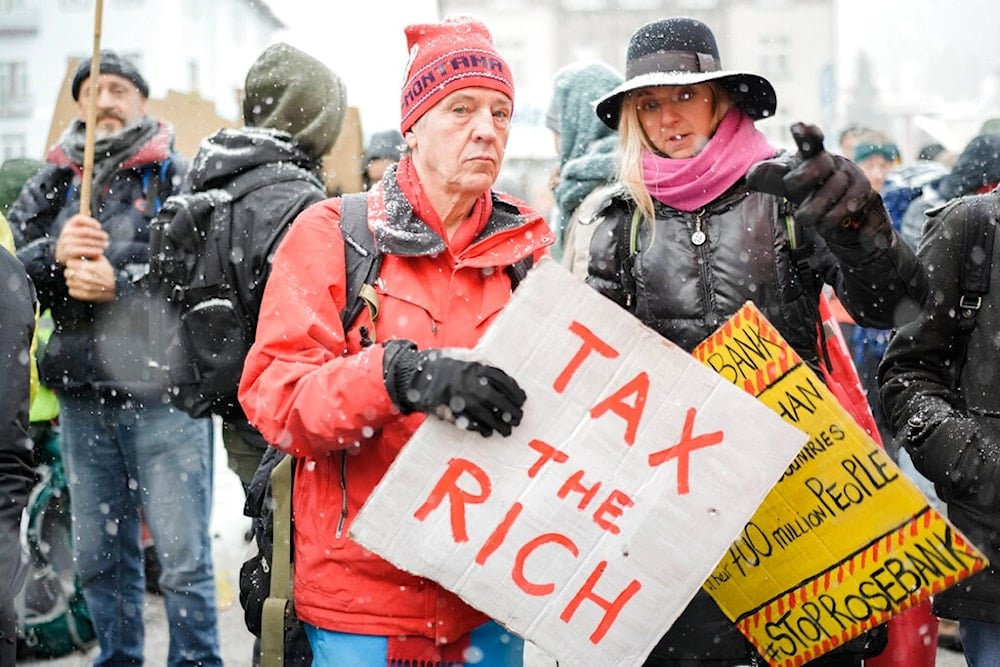5 billion people grow poorer as top 5 billionaires double their wealth
The gap between rich and poor continues to grow in a striking contrast, as the world expects to see its first trillionaire in 10 years, while world poverty is sustained for over another two centuries.
-

People attend a demonstration against the annual meeting of the World Economic Forum in Davos, Switzerland Sunday, January 15, 2023. (AP)
A report by Oxfam deduced that since 2020, the world's richest five men doubled their fortunes to a collective $869 billion, while the bottom 60% of the global population only got poorer.
The gap between rich and poor continues to grow in a striking contrast, as the world expects to see its first trillionaire in 10 years, while world poverty is sustained for over another two centuries.
The report showed that the world's billionaires' net worths increased at a rate triple the speed of inflation, totaling a whopping 3.3 trillion dollars since 2020 only. Out of the 10 top enterprises globally, seven are run by billionaire CEOs whose wealth and shares grow while lower-level employees' living standards keep sloping.
This comes as the super-rich gather for the annual World Economic Forum meeting held in Davos, Switzerland.
CEOs grow richer at the expense of workers
Data gathered by researching company Wealth X showed that the collective wealth of the top five billionaires - Elon Musk, Jeff Bezos, Mark Zuckerberg, Larry Ellison, and Bernard Arnault - saw a 114% influx, worth $464 billion. Simultaneously, as the rich get richer, the bottom 60%, almost 4.77 billion people, have seen a decline of 0.2% in total wealth.
"Across 52 countries, average real wages of nearly 800 million workers have fallen. These workers have lost a combined $1.5tn over the last two years, equivalent to 25 days of lost wages for each worker," the report stated, adding that lower-class workers have been taking on more exploitative and dangerous jobs to make ends meet.
Businesses have also seen major profits over 2023, stimulating added wealth for the rich, although households have been pressed amid a global living crisis. 148 giant corporations made a total of 1.8 trillion dollars in profits, signifying a 52% upsurge by July 2023, and surpassing the total profits recorded over the 2018 to 2021 interval.
Government accountability for impoverishment
In the United Kingdom, a wealth tax on net worths of over 10 million pounds has been contemplated to reduce a ballooning gap between the rich and the poor, which could bring in a 22 billion pound sum for the exchequer. Consequently, the compounded tariff summation could be invested into public services and infrastructure, improving the living standards across the country, especially for the vulnerable.
This comes as the UK's top 1% own 36.5% of financial assets in the Kingdom, worth 1.8 trillion pounds.
Read more: Inequality in the UK costs $161.8bn, rich are top 1% protected group
In a global context, the world's top 1% own 59% of all private financial assets. This marks the depth of income inequality in a global sphere, as it equals that recorded in South Africa, as estimated by the Gini index.
Aleema Shivji, Oxfam’s interim chief executive, advocated for a systematic change that shifts reality in favor of the unprivileged, saying that while billionaires scurry to overinflate their wealth in the trillionaire race, the world's poorest face worsening conditions. She also held governments accountable for favoring the rich and the intentional authorization of extreme inadequacy in income among the global population.
In a previous report, Oxfam urged for quick action to address a post-Covid widening in global inequality after showing that the richest 1% have collected nearly two-thirds of the additional wealth amassed since the start of the pandemic.
The charity stated, in a report released to coincide with the annual gathering of the global elite at the World Economic Forum in Davos, that the wealthy had collected $26 trillion in new wealth up to the end of 2021. That accounted for 63% of total new wealth, with the remaining 99% of people receiving the remainder.

 4 Min Read
4 Min Read








